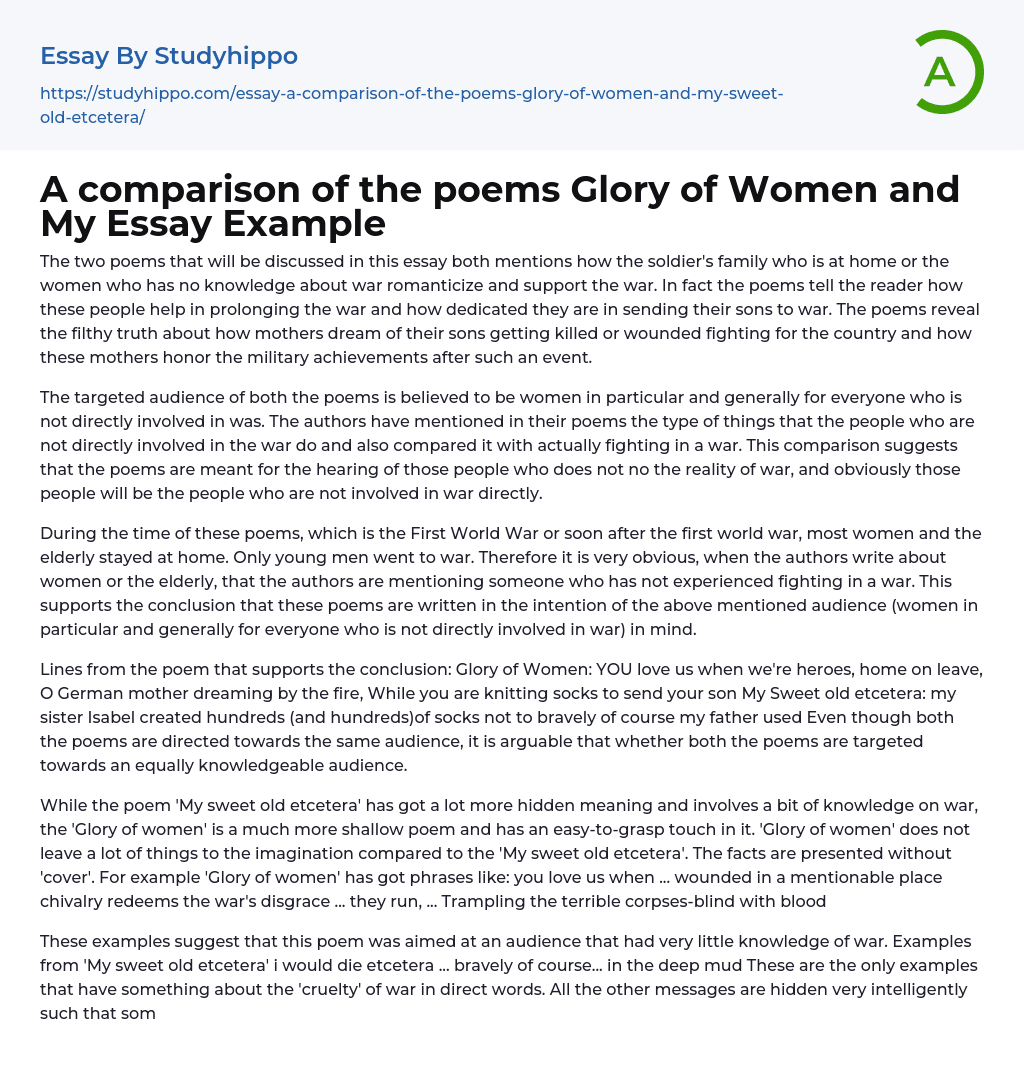The two poems that will be discussed in this essay both mentions how the soldier's family who is at home or the women who has no knowledge about war romanticize and support the war. In fact the poems tell the reader how these people help in prolonging the war and how dedicated they are in sending their sons to war. The poems reveal the filthy truth about how mothers dream of their sons getting killed or wounded fighting for the country and how these mothers honor the military achievements after such an event.
The targeted audience of both the poems is believed to be women in particular and generally for everyone who is not directly involved in was. The authors have mentioned in their poems the type of things that the people who are not directly involved in t
...he war do and also compared it with actually fighting in a war. This comparison suggests that the poems are meant for the hearing of those people who does not no the reality of war, and obviously those people will be the people who are not involved in war directly.
During the time of these poems, which is the First World War or soon after the first world war, most women and the elderly stayed at home. Only young men went to war. Therefore it is very obvious, when the authors write about women or the elderly, that the authors are mentioning someone who has not experienced fighting in a war. This supports the conclusion that these poems are written in the intention of the above mentioned audience (women in particular and generally for everyone who is not directly
involved in war) in mind.
Lines from the poem that supports the conclusion: Glory of Women: YOU love us when we're heroes, home on leave, O German mother dreaming by the fire, While you are knitting socks to send your son My Sweet old etcetera: my sister Isabel created hundreds (and hundreds)of socks not to bravely of course my father used Even though both the poems are directed towards the same audience, it is arguable that whether both the poems are targeted towards an equally knowledgeable audience.
While the poem 'My sweet old etcetera' has got a lot more hidden meaning and involves a bit of knowledge on war, the 'Glory of women' is a much more shallow poem and has an easy-to-grasp touch in it. 'Glory of women' does not leave a lot of things to the imagination compared to the 'My sweet old etcetera'. The facts are presented without 'cover'. For example 'Glory of women' has got phrases like: you love us when ... wounded in a mentionable place chivalry redeems the war's disgrace ... they run, ... Trampling the terrible corpses-blind with blood
These examples suggest that this poem was aimed at an audience that had very little knowledge of war. Examples from 'My sweet old etcetera' i would die etcetera ... bravely of course... in the deep mud These are the only examples that have something about the 'cruelty' of war in direct words. All the other messages are hidden very intelligently such that someone with prior 'war' knowledge can only grasp. Bringing to consideration that both of the poems are about war, it is also useful to discuss the authors' point of view
about war and the means conveying their point of view.
First, taking into account the poem 'Glory of women', it is found that this poem is quite visual. The poem includes lot of brutal truths about war which suggests a reader that war is bad and brutal. The interesting thing about these truths is that the presentations of these are very easily understandable and shallow as mentioned earlier. In contrast, 'My sweet old etcetera' does not have as many 'brutal' truths about war and even the very little it has (compared to the previous poem) is very difficult to pick up.
As obvious as it is that both the authors condemn war and especially the attitude of the (mentioned) audience towards war, the means of doing this differs. While Sassoon uses violence and 'images' to convey his message, Cummings uses a much more intimate and subtle way to approach the message. For the poems that are written by two authors who have had experience of war and suffered the grimace that war could offer, these are really very different approaches. Both the authors are conveying the same message but in absolutely different manner to the same audience but of different capacity.
- World War I essays
- World War Ii essays
- Atomic Bomb essays
- American Civil War essays
- Attack essays
- Cold War essays
- Crimean War essays
- Emilio Aguinaldo essays
- Iraq War essays
- Korean War essays
- Nazism essays
- Nuclear Weapon essays
- Philippine Revolution essays
- Trench Warfare essays
- Vietnam War essays
- Western Front essays
- Diplomacy essays
- Emperor essays
- Rwanda essays
- Tribe essays
- Revolutionary War essays
- War of 1812 essays
- Mexican American War essays
- Hitler essays
- The Spanish American War essays
- League Of Nations essays
- Battle Of The Somme essays
- Treaty Of Versailles essays
- Fascism essays
- D-day essays
- Atomic Physics essays
- Atomic Bombings Of Hiroshima And Nagasaki essays
- Electron essays
- 12 Angry Men essays
- A beautiful mind essays
- A Separation essays
- Alfred Hitchcock essays
- American Beauty essays
- American Films essays
- Animation essays
- Avatar essays
- Blade Runner essays
- Bollywood essays
- Bond essays
- Bridge essays
- Cinema Of The United States essays
- Comedies essays
- David essays
- Dead Poets Society essays
- Do The Right Thing essays




